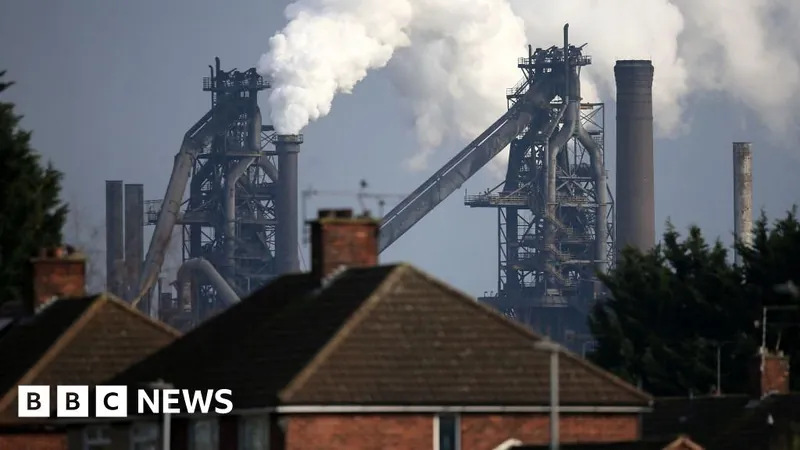
British Steel's Crisis: What’s Next for the Future of UK Steel Production?
2025-04-11
Author: Jacob
A Looming Crisis for British Steel
British Steel is teetering on the edge of closure with its key plant in Scunthorpe facing an uncertain future. In a dramatic move, the UK government has summoned Members of Parliament back from their Easter break to push through emergency legislation aimed at saving this crucial operation.
The Heart of UK Steel Production
Employing almost 2,700 people, the Scunthorpe plant represents a vital segment of British Steel, accounting for roughly three-quarters of the company's workforce. It stands as the last facility in the UK capable of producing virgin steel—a critical material for major construction projects ranging from skyscrapers to railways. The plant’s two massive blast furnaces are essential to delivering this high-quality steel, which boasts fewer imperfections than recycled alternatives.
The Ownership Dilemma
Originally taken over by the UK government’s insolvency service in 2019, British Steel was acquired by Chinese firm Jingye the following year. Despite a jaw-dropping £1.2 billion in investments, the plant is reportedly losing £700,000 daily, prompting Jingye to initiate a 45-day consultation regarding potential job cuts.
The Perfect Storm of Challenges
Jingye has cited "highly challenging" market conditions, tariffs, and pressure to transition to greener production methods as factors leading to the plant’s downturn. With dwindling supplies of raw materials like coking coal and iron pellets, the urgency to act is escalating. Critics have accused the company of mismanagement, alleging it failed to secure essential materials to maintain production.
Government Intervention on the Horizon?
The potential government intervention could grant authorities the power to oversee operations and ensure the necessary resources are procured to sustain production. Sir Keir Starmer has already indicated intentions to fast-track legislation, pressing for measures that would allow the government to direct company operations, including workforce management. Any workers laid off would have a chance to be reinstated under this new law.
Voices from the Industry
Trade unions warn that British Steel is on a precarious edge, with some even calling for outright nationalization to preserve the steelmaking industry in the UK. Union leaders describe the current lack of essential supplies as an "extreme emergency," emphasizing the dire need for action.
A Broader Steel Landscape
While British Steel is facing trials, it’s worth noting that 1,160 businesses in the UK steel sector support around 40,000 additional jobs nationwide. Giant Tata Steel, formerly the largest producer, recently shut down its blast furnace, citing crippling losses. Other industry players like Liberty Steel and Celsa are also grappling with high energy costs and operational challenges.
The Economic Impact
In 2023, the UK steel industry contributed a modest £2.3 billion to the economy, equivalent to just 0.1% of the country's GDP. As it stands, the UK accounts for only 0.3% of global steel production, dwarfed by giants like China, which produced over 1,000 million tonnes, and the EU's 126 million tonnes. With British steel production dwindling, the nation risks being left behind in this critical industry.
The road ahead is uncertain, but one thing is clear: the future of British Steel—and, by extension, UK steel production—hangs in the balance.









 Brasil (PT)
Brasil (PT)
 Canada (EN)
Canada (EN)
 Chile (ES)
Chile (ES)
 Česko (CS)
Česko (CS)
 대한민국 (KO)
대한민국 (KO)
 España (ES)
España (ES)
 France (FR)
France (FR)
 Hong Kong (EN)
Hong Kong (EN)
 Italia (IT)
Italia (IT)
 日本 (JA)
日本 (JA)
 Magyarország (HU)
Magyarország (HU)
 Norge (NO)
Norge (NO)
 Polska (PL)
Polska (PL)
 Schweiz (DE)
Schweiz (DE)
 Singapore (EN)
Singapore (EN)
 Sverige (SV)
Sverige (SV)
 Suomi (FI)
Suomi (FI)
 Türkiye (TR)
Türkiye (TR)
 الإمارات العربية المتحدة (AR)
الإمارات العربية المتحدة (AR)